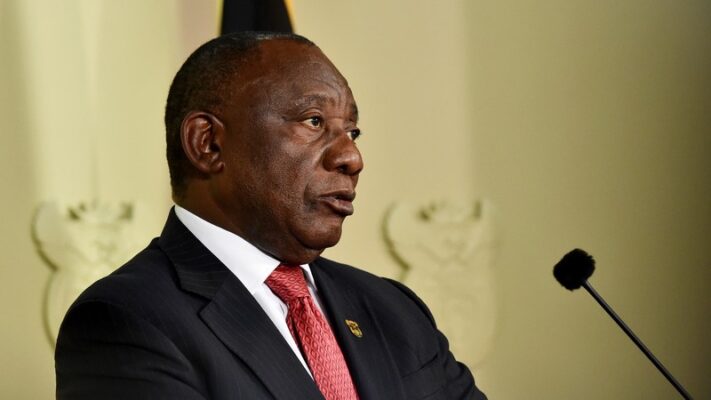By Straightnews
As pressure mounts on South African President Cyril Ramaphosa with #Ramaphosamustgo trends to quit the prime position over announcement of a five-year visa policy for Nigerians, he remains adamant.
Ramaphosa, barring Xynophobic attacks on foreigners, announced simplified visa processes aimed at facilitating travel for Nigerian business people and tourists.
The move, aimed at boosting economic and tourism activities, was announced during the 11th Session of the South Africa-Nigeria Bi-National Commission in Cape Town on December 3.
Also read
- End xenophobic attacks, Clergyman tells Ramaphosa
- Ramaphosa Re-Elected South Africa’s President After Coalition
- Omicron: Fears mount on Ramaphosa’s Visit to Nigeria
The decision has sparked a growing backlash in South Africa, with some citizens taking to the social media to demand his resignation.
Critics have called for the reversal of the decision, accusing the government of prioritising foreign relations over domestic concerns. The outcry has included an open letter to the president and widespread criticism online.
Responding to the backlash, the presidency clarified that the initiative was part of broader efforts to modernise and streamline visa application processes globally.
“Our efforts to create a favourable environment include introducing a simplified visa process for Nigerian business people. Those who qualify can be granted a five-year multiple-entry visa,” Ramaphosa explained. He added that Nigerian nationals would no longer need to produce a passport to apply for visa.
The announcement came at a time when relations between Nigerians and South Africans have been tense, often reflected in heated exchanges on the social media. Critics argue that the relaxed visa policy could exacerbate existing social and economic challenges within South Africa.
Despite the criticism, the government maintains that the policy is part of a strategy to strengthen bilateral ties and enhance economic cooperation between the two countries.
Nigeria woos South African investors
Already, more than 100 South African businesses are established in Nigeria. Some of the companies include the MTN Group, Shoprite, Multichoice, Standard Bank, Remgro, Pick ‘n Pay Holdings, Clover Industries and Naspers.
For instance, Shanduka Group, a South African company, owned by Ramaphosa acquired a $335 million (N63 billion) stake from three private investors in MTN Nigeria, Nigeria’s largest mobile operator with more than 45.6 million subscribers in November 2012, a statement announced.
Additionally, Nigeria is targeting $500 million in initial investment from foreign investors into its nascent solid minerals sector as it began a four-day investment roadshow in South Africa on November 6 at the Sandton Convention Centre.
The roadshow which will run until November 9 is being organised by the Nigeria High Commission in collaboration with South Africa-based investment bank, Rosebank Capital.
This year’s theme “Unlocking the potentials of solid minerals for sustainable development in Nigeria and South Africa,” aims to attract foreign direct investments in Nigeria’s solid minerals sector by leveraging South Africa’s advanced expertise in mining and resource development.
Nigeria boasts a wealth of mineral resources, from gold to tantalite, limestone and lithium.
With an estimated $700 billion worth of mining potential, the nation’s geological composition presents a treasure trove waiting to be tapped.
However, despite this potential, mining exploration in Nigeria remains underfunded, with several projects stuck at exploration stage due to challenges in accessing financing for design, construction and production.
The high capital risk and expertise gap continue to pose significant barriers for private sector participation and investments.
“We are targeting at least $500 million in initial investments and that is coming on really well,” said Niyi Oloruntoba, CEO of Rosebank Capital. “We are already discussing a single project worth $200 million,” Oloruntoba said.
Xenophobic Violence in Post-Apartheid South Africa
Xenophobia in South Africa stands out for its particularly violent nature. According to Witwatersrand University’s Xenowatch, xenophobic attacks resulted in 669 deaths, 5,310 looted shops, and 127,572 displacements between 1994 and March 2024.
In May 2008, attacks took place in at least 135 locations across the country. The perpetrators of such attacks did not target white people but rather migrants from other African countries and to a lesser degree from South Asian countries, whom they blamed for increased crime and the high unemployment rate in South Africa.
A significant proportion of both perpetrators and victims of xenophobic violence come from marginalized communities with attacks clustering in townships and informal settlements. Inadequate housing and service provision combined with widespread unemployment, poverty, and crime in these communities provide fertile grounds for vigilante violence against migrants.
The Put South Africans First movement emerged on Twitter during the early lockdown period. On April 27, 2020, anti-immigrant hashtags flooded South African cyberspace with the hashtag ‘Put South Africa First’ being used over 16,000 times in a single day.
In September 2020, a public march to the Nigerian and Zimbabwean embassies demanded the deportation of their nationals.
This march was organized through Twitter under the hashtags ‘23SeptemberCleanSA’ and ‘ForeignersMustGo’. By 2021, the vigilante movement and now political party, called Operation Dudula (meaning “Pushback” in isiZulu), was formed in Soweto.
On June 16, 2021, Operation Dudula launched a campaign called “Let’s Clean Soweto” to rid the township of “illegal migrants,”’ drug dealers, and foreign business owners, targeting and evicting migrants from Zimbabwe and Mozambique, as well as local South Africans who were wrongly identified as foreign nationals.
Anti-immigrant movements like Operation Dudula and Put South Africa First are rooted in the fear that migrants from other African countries could marginalize South Africans on their own land. They call for the mass deportation of foreigners to restore the dignity of South Africans. South Africans, in turn, must reclaim the jobs, housing, education, and healthcare that rightfully belong to them.

